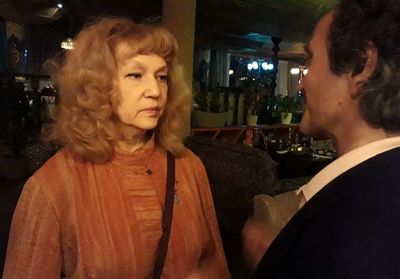She added: Iran has a rich culture. It has managed to preserve and develop its classical music. It also has what it takes to borrow from the classical music in the West. Iranian classical music is appealing per se. It’s very close to the Russian culture.
A jam session is a relatively informal musical event, process or activity where musicians, typically instrumentalists, play improvised solos and vamp on tunes, songs and chord progressions. According to Karatygina, symphonic music or classical music in Iran is going through a path its Russian counterpart went in the 18th century - art music produced or rooted in the traditions of European culture, including both liturgical (religious) and secular music.
She added: Iranians enjoy listening to classical music and want to learn more about it. Iran has a great culture. The European classical music is part of this culture. It needs to be there. At this stage it’s hard for Iranians to master this kind of music. Once they master the art, however, they can easily perform it. Technically speaking, it’s not that hard to learn the classical music.
Karatygina stressed that the secret to classical music is that the instrumentalist needs to forget all about himself or herself when playing a string instrument. The instrumentalists should play or vamp on similar tunes, songs and chord progressions. They should never play out of tune. This is difficult for Iranian string players because they have pride and don’t want to stay in tune. It’s easy to spot the problem in your concerts when the correct musical sound is not played.
In conclusion, the head of the International Cooperation Department’s Office for Moscow Tchaikovsky Conservatory said jam session is one of the greatest achievements of Iranian music: Your musicians should uphold this great achievement and should never allow the European classical music influence it in any way. I don’t like to read your music’s notes on a paper before actually listening to it in a live performance. This intellectual property should be preserved and protected. At the same time, you could perform other types of music.
Rudaki Arts and Culture Foundation and Moscow Tchaikovsky Conservatory signed a memorandum of understanding in Moscow in March to enhance cooperation. The two sides agreed to develop educational collaboration and concentrate on joint productions. They also agreed to organize workshops in Iran and Russia, and exchange composers and students. Rudaki Arts and Culture Foundation, as one of the major custodians of music, is in charge of the Tehran Symphony Orchestra and the Iranian National Orchestra.

